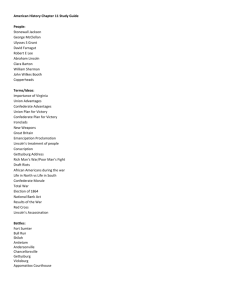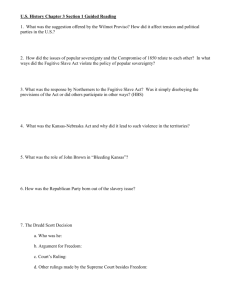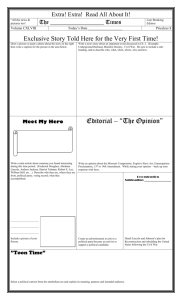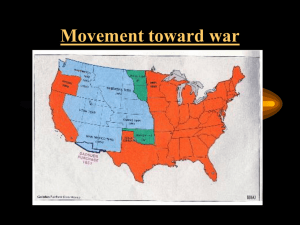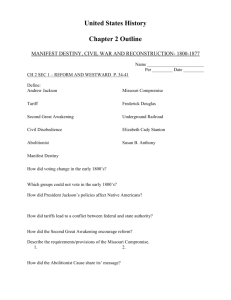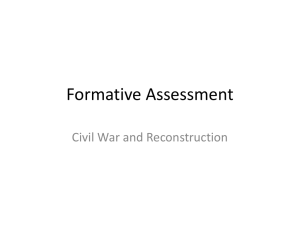new goal 3 - JJonesUSHIstory
advertisement
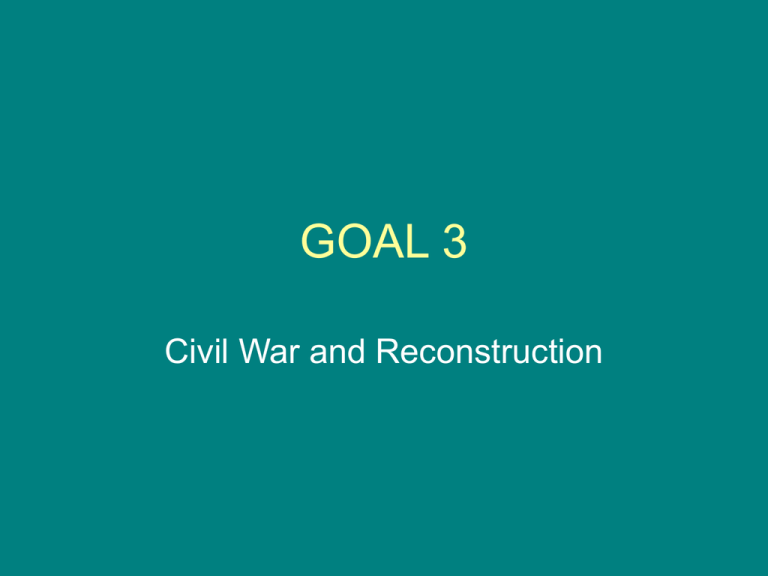
GOAL 3 Civil War and Reconstruction 3.01 Trace the economic, social, and political events from the Mexican War to the outbreak of the Civil War. Debate over Expansion of Slavery Kansas Nebraska Act• allowed popular sovereignty for Kansas and Nebraska • Popular Sovereignty-idea that a territory can decide whether or not to have slavery Bleeding Kansas • mini civil war; fought over issue of slavery in Kansas • Caused by the Kansas Nebraska Act Brooks Sumner Incident • Preston Brooks hit Charles Sumner with a cane because of the debate over slavery • Debate was about Kansas Nebraska Act Freeport Doctrine • idea by Stephen Douglas that states can forbid slavery even if the Supreme Court said they couldn’t Compromise of 1850 • made concessions for the North: (1) California is a free state (2) slave trade outlawed in Washington, DC… • Concessions for the south: (1) Strict fugitive slave act-means runaway slaves had to be returned (2) Popular Sovereignty in New Mexico and Utah Compromise of 1850 Dred Scott Case • Supreme Court ruled 3 major things: • (1) Slaves are not citizens • (2) Slaves are property (3)Missouri Compromise is unconstitutional • Hurts the abolitionist movement Growing Sectionalism Slave Codes • slaves couldn’t be taught; they could not own weapons; etc. • Southern states wanted more control over slaves • Brought about by revolts (Nat Turner in Va & Denmark Vesey in SC) • Underground RR- Harriet Tubman Fugitive Slave Act • US citizens must report runaway slaves and help return them to their owner • Made the north extremely angry Uncle Tom’s Cabin • Book by Harriet Beecher Stowe; helped the abolitionist movement • Book gave people chance to see exactly how slaves lived • Lincoln called Stowe “the little lady that started this big war” John Brown • Abolitionist • led raid on federal arsenal at Harper’s Ferry, Va. • Wanted to arm runaway slaves • executed 3.02 Analyze and assess the causes of the Civil War Long Term Causes North vs. South • Slavery is the main issue • States’ rights become an issue • South viewed the government as an agreement between state and national governments, which a state could remove itself from (secession) • Remember: compact theory and nullification • South saw expansion as an economic opportunity which needed slavery Immediate Causes of the War Election of 1860 • Lincoln wins with no southern votes • Lincoln is a Republican • Lincoln is not an abolitionist, but he does want to keep slavery from spreading • South Carolina secedes within a month of Lincoln’s victory Secession • SC first, then 6 other deep south states • Eventually 11 states in all secede • They formed their own nation…Confederate States of America (CSA) Slave states not seceding • Kentucky, Missouri, Delaware, Maryland • Lincoln feels he has to keep Maryland from seceding • If Maryland secedes then the nation’s capital will be surrounded by confederates • Lincoln uses martial law (military law) to keep Maryland • Lincoln suspended Habeas Corpus Ft. Sumter • First shots of the Civil War (April 1861) • South prevents the north from supplying this FEDERAL fort; this makes the south the aggressor • This solidifies northern public opinion against the south Ft. Sumter 3.03 Identify political and military turning points of the Civil War and assess their significance to outcome of the conflict. Advantages of each side North • • • • • Stronger economy (banks) Real government More industry More railroads More people So uth • Better generals ********* • Fighting a defensive war • More accustomed to outdoor life Strategies of each side North: Anaconda Plan • Blockade southern ports; prevent exporting or importing goods • Take the Mississippi River; this would divide the south • Take Richmond, Va. which was the capital of the CSA • Wage total war: destroy the will of the civilians to fight South: Cotton Diplomacy • Get help from Europe because they needed cotton from the south • Fight a defensive war; war of attrition New military technology Ironclads • Ships armored by iron sheets • Helped defend against cannon fire • Monitor (US) v. Merrimack (CSA)- battle of ironclad ships Submarines • CSS Hunleysuccessful confederate sub • Sank Union blockade vessel in Charleston harbor • Helped change future naval wars Total War • Wage war against the entire population • Break the will of the people to wage war • Lay cities under siege; people will be on the brink of starvation so the city will surrender • Sherman’s March will be an example of total war Executive Powers during Civil War Habeus Corpus • This is the right of the accused to be told why they are being taken into custody • Lincoln suspended this to prevent future rebellions • Do not have to provide evidence of a crime before arresting someone Emancipation Proclamation • Make Europe think the war is about slavery • Freed slaves in areas of rebellion; freed slaves in states that seceded • Changed the purpose of the war from preserving the union to freeing the slaves (moral cause) Gettysburg Address • • • • After the battle of Gettysburg, Pa. Dedication of the cemetery at Gettysburg Laid out the goals of the war “four score and seven years ago…” African American participation • Wanted to be active in gaining their freedom • Gave north more power in fighting the war • 54th Massachusetts Key battles of the Civil War First Bull Run FIRST MAJOR BATTLE CONFEDERATEs WIN LINCOLN AND NORTH REALIZES THE WAR WILL LAST LONGER THAN ORIGINALLY THOUGHT ENLIST 500,000 MEN OVER THE NEXT 3 YRS Antietam • MARYLAND • BLOODIEST ONE DAY OF THE WAR • 6,000 KILLED; 16,000 WOUNDED • UNION VICTORY • GB DECIDES NOT TO GET INVOLVED • Why??? Gettysburg • PENNSYLVANIA • TURNING POINT OF THE WAR • UNION VICTORY • JULY 1ST-JULY 4TH 1863 • PICKETT’S CHARGE (CONFEDERACY) • CONF-28,000 CASUALTIES; UNION 23,000 Vicksburg • IN MISSISSIPPI; PLACED UNDER SIEGE • UNION ATTACKS FROM SOUTH • GIVES THE UNION CONTROL OF THE MISS. R. SHERMAN’S MARCH • WILLIAM SHERMAN (U) MARCHES TO ATLANTA AND BURNS IT…HE THEN GOES TO SAVANNAH BURNING EVERYTHING FORCING THE SOUTH TO SURRENDER Political and Military leaders of the Civil War Robert E. Lee • General for the Confederate Army • Possibly the best leader of all the Civil War • From Virginia • Was not a major supporter of secession Stonewall Jackson • Confederate military leader • Gained fame at Bull Run Jefferson Davis • President of the CSA • Capital located in Richmond Ulysses S. Grant • Union general • Defeated Lee to win the war • Elected president in 1868 William T. Sherman • Made wasteland of the south during his March to Sea • “War is hell” George McClellan • Slow, cautious commander of the Union • Fired by Lincoln after Antietam • Runs for president in 1864; defeated by Lincoln John Wilkes Booth • Southern actor • Confederate sympathizer • Assassinated Lincoln Resistance to the War Effort Copperheads • Northern democrats that favored allowing the south to secede Draft Riots • Occurred in northern cities • Some northerners did not want to fight to free slaves (ESPECIALLY TRUE OF THE IRISH) • They saw the Civil War as a rich man’s war and a poor man’s fight 3.04 Analyze the political, economic, and social impact of Reconstruction on the nation and identify the reasons Reconstruction came to an end Limits on presidential and congressional power Radical Republicans • Group in Congress that wanted to punish the South • Wanted to tear down the social and political powers that started the war • Led by Thaddeus Stevens and Charles Sumner Presidential Plans of Reconstruction • Lincoln and Johnson • Be lenient on the south (Lincoln was more lenient than Johnson) • Lincoln said “Let ‘em up easy”, and “charity for all and malice toward none” • 10%plan • Pardon most confederates Congressional (Radical) Reconstruction • Punish the south • Re-work the social and political hierarchy • Military Reconstruction- military occupied zones in the south to enforce Reconstruction policies (south hated this the most) Military Reconstruction Andrew Johnson • Viewed as weak • Vetoed many Reconstruction Acts • Impeached for violating the Tenure of Office Act (he was not removed from office though) Reconstruction: Resistance and Decline Compromise of 1877 • Election of 1876 is too close, accusations of cheating, so no winner is declared • Compromise strikes deal to give the victory to Rutherford B. Hayes if he removes military from south • Ends reconstruction Scalawags and Carpetbaggers • Two most hated groups in the south after Civil War • Scalawags- white southerners that supported republicans and Reconstruction • Carpetbaggersnortherners that came south after the war to “help” freedmen and make money Black Codes • Passed by southern states to keep white southerners in charge and restore some of the pre-war racial system • Most were repressive • Kept blacks from voting Ku Klux Klan • Terrorist group started as a Confederate veterans organization • Kept blacks from voting and took away other civil rights Enfranchisement and Civil Rights Freedmen’s Bureau • Designed to give freed men and poor whites education, food, clothing, and medical supplies • It did very little Solid South • Whites eventually regain the state legislatures • Set laws that ensured southern states would vote Democrat • Banned black voting through literacy tests, poll tax, and grandfather clauses Civil War Amendments • 13th- abolished slavery • 14th- defined citizenship, provided all citizens equal protection under the law, guaranteed due process • 15th- granted black male suffrage (right to vote) Life of Freed Slaves • Tenant Farmers • Sharecroppers
